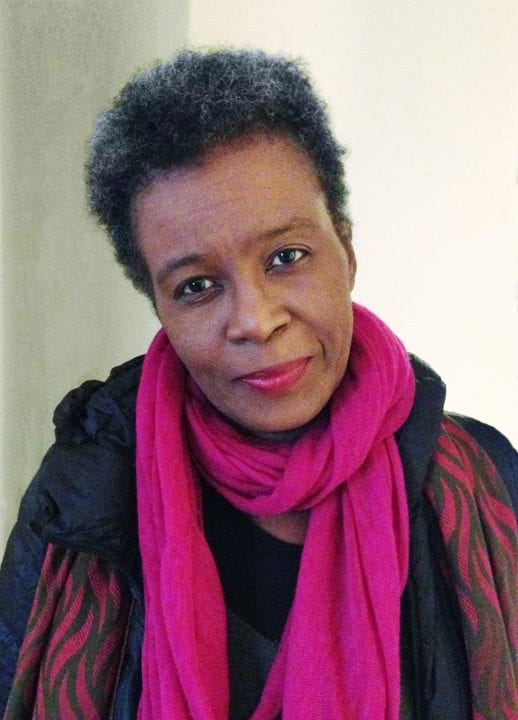Claudine Rankine’s most recent work, Citizen: An American Lyric (2014) a book-length poem about race and the imagination, was the winner of the National Book Critics Circle Award and a finalist for the National Book Award.
Claudia Castro Luna, Seattle’s Civic Poet, will moderate the Q&A for this event.
Her other published works include, Don’t Let Me Be Lonely: An American Lyric (2004) an experimental multi-genre project that blends poetry, essays and images, and Nothing in Nature is Private (1994), which won the Cleveland State Poetry Prize. Of Don’t Let Me Be Lonely the poet Robert Creeley says of this collection, “Claudia Rankine’s formally inventive poems investigate many kinds of boundaries: the unsettled territory between poetry and prose, between the word and the visual image, between what it’s like to be a subject and the ways we’re defined from outside by skin color, economics, and global corporate culture. This fearless poet extends American poetry in invigorating new directions.”
Rankine has coedited American Women Poets in the 21st Century: Where Lyric Meets Language (2002), American Poets in the 21st Century: The New Poetics (2007), and The Racial Imaginary: Writers on Race in the Life of the Mind (2014).
Her poems have been included in the anthologies Great American Prose Poems: From Poe to the Present (2003), Best American Poetry (2001), and The Garden Thrives: Twentieth Century African-American Poetry (1996). Her play Detour/South Bronx premiered in 2009 at New York’s Foundry Theater.
Rankine has been awarded fellowships from the Academy of American Poets, the National Endowment for the Arts, and the Lannan Foundation. In 2013, she was elected as a Chancellor of the Academy of American Poets, and in 2014 she received a Lannan Literary Award.
Born in Kingston, Jamaica, poet Claudia Rankine earned a BA at Williams College and an MFA at Columbia University. She is currently the Henry G. Lee Professor of English at Pomona College.
“You are in the dark, in the car…” from Citizen: An American Lyric
The new therapist specializes in trauma counseling. You have only ever spoken on the phone. Her house has a side gate that leads to a back entrance she uses for patients. You walk down a path bordered on both sides with deer grass and rosemary to the gate, which turns out to be locked.
At the front door the bell is a small round disc that you press firmly. When the door finally opens, the woman standing there yells, at the top of her lungs, Get away from my house. What are you doing in my yard?
It’s as if a wounded Doberman pinscher or a German shepherd has gained the power of speech. And though you back up a few steps, you manage to tell her you have an appointment. You have an appointment? she spits back. Then she pauses. Everything pauses. Oh, she says, followed by, oh, yes, that’s right.
I am sorry. I am so sorry, so, so sorry.
“I don’t usually talk to strangers…” from Don’t Let Me Be Lonely:
I don’t usually talk to strangers, but it is four o’clock and I can’t get a cab. I need a cab because I have packages, but it’s four o’clock and all the cabs are off duty. They are making a shift change. At the bus stop I say, It’s hard to get a cab now. The woman standing next to me glances over without turning her head. She faces the street where cab after cab drives by with its light off. She says, as if to anyone, It’s hard to live now. I don’t respond. Hers is an Operation Iraqi Freedom answer. The war is on and the Department of Homeland Security has decided we have an elevated national-threat level, a code-orange alert. I could say something, but my packages are getting heavier by the minute and besides, what is there to say since rhetorically it’s not about our oil under their sand but about freeing Iraqis from Iraqis and Osama is Saddam and Saddam is “that man who tried to kill my father” and the weapons of mass destruction are, well, invisible and Afghanistan is Iraq and Iraq is Syria and we see ourselves only through our own eyes and the British, but not the French, and Germany won’t and Turkey won’t join us but the coalition is inside Baghdad where the future is the threat the Americans feel they can escape though there is no escaping the Americans because war, this war, is about peace: “The war in Iraq is really about peace. Trying to make the world more peaceful. This victory in Iraq, when it happens, will make the world more peaceful.”
Selected Works:
Books
Citizen: An American Lyric (2014) – Winner of the Poets and Writers’ Jackson Poetry Prize and finalist for 2014 National Book Award in Poetry, the National Book Critics Circle Award in Poetry, and the National Book Critics Circle Award in Criticism
Si toi aussi tu m’abandonnes (2010)
Don’t Let Me Be Lonely (2004) – Winner of the Poets and Writers’ Jackson Poetry Prize
Plot (2001)
The End of the Alphabet: Poems (1998)
Nothing in Nature is Private (1995) – Winner of the Cleveland State Poetry Prize
Stage Productions
Existing Conditions (2010)
Provenance of Beauty (2009)
Links
Claudia Rankine’s Website
“The Condition of Black Life is One of Mourning”
BOMB Magazine’s Artists in Conversation
A Poetry Personal and Political
